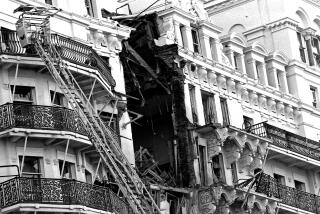Car Bomb Kills Thatcher Aide Opposed to IRA
- Share via
LONDON — In an apparent sharp escalation of the Irish Republican Army’s campaign to bring violence closer to Prime Minister Margaret Thatcher and her Conservative Party, a senior lawmaker who was considered Britain’s most strident IRA opponent was killed Monday when a powerful bomb ripped through his car.
Ian Gow, who was among the prime minister’s closest friends and parliamentary aides, was killed instantly by the blast in the driveway of his home in the coastal village of Hankham, 40 miles southeast of London.
Thatcher described the murder of Gow, 53, as “a grievous loss to me personally.”
“Every day for four years, he went through that door behind me,” Thatcher told reporters outside her home at 10 Downing St., where Gow served as her first private parliamentary secretary after she took office in 1979. “I don’t think I could have done those four years without him. . . . He made an enormous contribution to everything I have been able to do.”
Gow served two additional years in Thatcher’s Cabinet and resigned in 1985 only because of his deep personal conviction on the issue of Northern Ireland. He submitted his resignation on the day of the signing of the Anglo-Irish Agreement, which gave the Republic of Ireland the right to help determine the future of Britain’s embattled Northern Ireland province.
Scotland Yard’s anti-terrorism chief, George Churchill-Coleman, said he was convinced that Gow’s killing was the work of the IRA. The group has yet to claim responsibility.
Churchill-Coleman added that Gow’s name was prominently included on an IRA hit list recovered by police during a 1988 raid on a terrorist hide-out.
According to officials, the nearly five-pound car bomb that exploded Monday as Gow got into the car at about 8:30 a.m. was a sophisticated device with a mercury switch detonator, which is activated by movement. It was similar to bombs used previously by the IRA.
Looking shaken, Thatcher visited the site of the blast later Monday.
Churchill-Coleman said police had consulted Gow about his security and advised him to take precautions, but Gow refused, insisting, for example, that his home telephone number remain listed so constituents could reach him easily.
A conservative hard-liner in every way, Gow appeared just last week on major television news shows in Britain after an IRA land mine outside Belfast killed three policemen and a Roman Catholic nun.
“These murders are as odious as they are futile,” Gow declared angrily. “Once again, wives have been turned into widows and children have been turned into orphans. They will never, ever win. We will never surrender.”
Describing Gow as “a natural target” for Irish militants, British Home Secretary David Waddington praised him as “outspoken and courageous.” The Conservative Party chairman, Kenneth Baker, declared in a statement that Gow “was fearless in his attacks upon the IRA, fearless in his attacks upon terrorism.”
Even Thatcher’s opponents in the Labor Party lavished Gow with praise and attacked the Irish violence that has become one of the few shared causes among Britain’s ruling and opposition parties.
“This is a terrible atrocity against a man whose only offense was to speak his mind,” opposition leader Neil Kinnock said. “I had great disagreement with Ian Gow and he with me, but no one can doubt his sincerity or his courage, and it is appalling that he should lose his life because of these qualities.”
Gow, a 14-year veteran in Britain’s House of Commons, was serving as chairman of the ruling party’s committee on Northern Ireland, and he long favored military rather than political steps to solve the terrorism and violence of the troubled province. He fought the 1985 accord bringing the Republic of Ireland into the negotiation process because he believed it would “prolong, and not diminish, the agony of Ulster.”
In several speeches to Parliament, Gow proved an articulate spokesmen for hard-line Conservatives as he condemned the Irish Republic as a haven for terrorists operating in Northern Ireland and Britain. He maintained that cooperation between the governments in Dublin and London on the issue of Irish militancy was “a myth.”
Gow was the first Conservative Parliament member to be killed in such an incident since the 1984 IRA bombing of the Brighton Hotel, where the Conservatives were holding a party conference. The attack, which apparently was aimed at Thatcher herself, killed Sir Anthony Berry and injured two other lawmakers.
Monday’s car bombing appears to be the 12th in a series of intensifying attacks this year by the IRA, both in Northern Ireland and in England.
Last week, the IRA warned police before a 10-pound time bomb exploded in the visitors’ gallery of the London Stock Exchange, causing extensive damage but no casualties.
More to Read
Sign up for Essential California
The most important California stories and recommendations in your inbox every morning.
You may occasionally receive promotional content from the Los Angeles Times.












